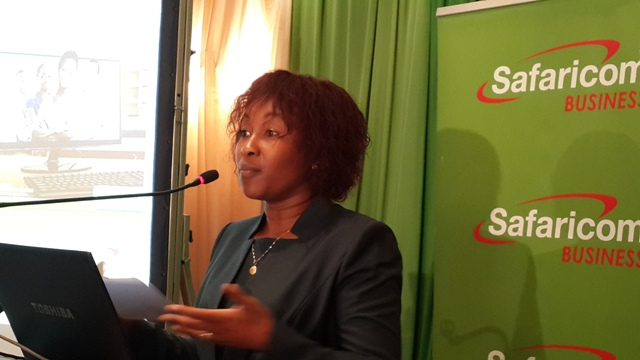Earlier this month Safaricom launched its Software as a service offering in the form of online business management solutions, including: payroll processing, accounting, professional email and Website hosting. Apparently they have licensed the software from Sage pastel (a South African company that creates online business management solutions). What they are now using the Sage software to do is get Small and Medium Enterprises to do their book keeping on the Safaricom Business Cloud platform as opposed to the manual entry books most of them currently use. According to the press release:
Well that’s just great. However, I have been waiting for them to launch serious Infrastructure as a service (Iaas) & Platform as a service (Paas) offerings since 2012 to no avail. The Software as a service (Saas) product they launched was thus somewhat underwhelming. I wrote a piece back in May of 2013 about ‘Why Kenyan Telcos Need To start Thinking Like Web Companies’ and it was pretty well received, eventually leading to a somewhat engaging debate on social media. However, well received and well taken are not one and the same thing. Especially considering the fact that those to whom it was directed seem to have just drove on by without a second thought. They did the usual Public Relations move of quieting it down on social media with a vague statement about being interested in dialogue and finding a way forward. Neither happened of course. Even so, I was hoping they are thinking it through and will pilot something before the year was over. I went into why providing Amazon-type hosting would be a good business case for them in the previous post so I won’t delve into the reasons here.
Safaricom announced towards the end of 2011 that they were spending 2 billion shillings on the ‘Safaricom Cloud’. Naturally a significant chunk of this went to setting up the facility, getting the hardware, sourcing the expertise required and acquiring virtualization licenses. Hopefully a decent amount also went to training in an attempt to build internal capacity for both maintenance and future deployments of a similar nature. As one of the commenters in my previous article pointed out the web technology support system ‘goodies’ of which I spoke mostly lie in the VAS (Value Added Services) layer and it is still quite unclear exactly how much (if anything) was spent on software in this area.
Data centers are not cheap to maintain. Letting one sit around under-utilized is a pretty bold waste of resources. Not utilizing such vast economies of scale is something I find difficult to understand. I’ll give you an example. They have about 4 petabytes of storage space in their data center facility. Just to put that into perspective, that’s enough space to store 53.2 years of continuous HD-TV video (i.e. an uninterrupted HD stream running longer than the entire lifetime of the average person in many countries). It’s been a year now and what are they doing with all this capacity? Safaricom by itself currently does not generate enough data to need such a facility for its own use so this was obviously a business investment. My question is what was on the proposal that got the project approved and got them the funds to do it? I doubt it was cloud-based business management solutions for East African SMEs. While a large potential market in its own right, it barely scratches the surface of what can be achieved with an investment like that. So how did they justify a nine figure investment to the board? I figure there are 2 things that could have gotten that check signed. Either they were/are planning to begin hosting the Mpesa system on Kenyan soil (which given the revenue it generates for them now and the margin by which hosting it locally would raise earnings, makes the investment sensible) but since there are no indicators of this happening anytime soon, we have to move on to bachelorette number 2. There must have been a range of sizeable hosting service solutions making up a significant chunk of the projected offerings as a result. It’s the most likely way they would look to break even on their investment in a reasonable time-frame. And yet here we are, over a year later with nothing competitive or even up to date in this area.
That said, their silence and seeming unwillingness to do what I championed in the previous post does not amount to a failure on the part of what it is they actually chose to do first. This is an important step in getting business as a whole into the cloud. Their colossal image and marketing muscle will definitely make a sizeable dent in the problem of modernizing old book-keeping practices among SMEs. However, I (and by extension the entire developer & integrator layer of the Kenyan tech industry) am left wanting. Not to sound obsessive but again I ask Safaricom: Where is my elastic compute? Where is my toggle control panel? Where is my pay-only-for-what-you-use billing? These are the tools the fastest growing economic sector in the country needs (and in a timely manner) if we are to really compete on the global stage. Amazon already has a development center in South Africa expressly targeting EC2. Locally, promising upstarts like Angani have seen the massive opportunity and are responding accordingly. Safaricom has the capacity. The Safaricom Cloud should by now be providing something modern on Kenyan soil, upon which businesses on the development and integration end of the spectrum can both run and grow. Price it competitively and many more SMEs in the ICT sector will not only gladly use your cloud-based accounting tools for record keeping but they will actually be able to break some new ground in terms of web-based innovation while at it.
I understand the urge to be careful but we need to break out of our comfort zones. The world is not only moving fast, it is accelerating with each passing day. New technologies, new markets and new revenue streams don’t just appear. They require risk-takers to make them happen. I hate to be the bearer of bad news but sure-footedness and innovation are mutually exclusive. Sooner or later you just have to pick one.



